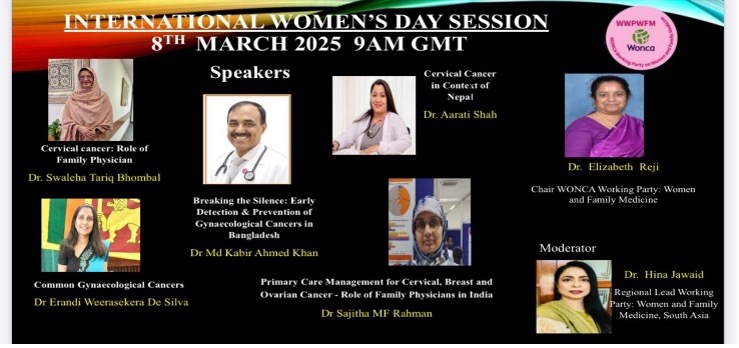IWD: Accelerating Action
Accelerating Action
Historically, the medical profession has been male dominated, with women facing significant barriers to entry and advancements. However, women family physicians are breaking down these barriers, challenging stereotypes, and redefining the face of medicine. By doing so, they inspire future generation of women to pursue a career in healthcare, promoting diversity, equity and inclusion.
Despite progress, healthcare workers, especially females, continue to face significant barriers to equal participation and opportunities. To improve the lives of female family physicians/doctors requires a multi-faceted approach. Here are some strategies to accelerate action:
Workplace Support
- Flexible scheduling: Offer flexible scheduling to accommodate family responsibilities and self-care.
- Parental leave policies: Implement generous parental leave policies for both mothers and fathers.
- Childcare support: Provide childcare support, such as on-site childcare or childcare stipends.
Career Development and Leadership Opportunities
- Mentorship programs: Establish mentorship programs that pair female doctors with experienced mentors to support career advancement and leadership development.
- Leadership training: Offer leadership training and coaching to help female family physicians develop leadership skills.
- Promotion of women to leadership positions: Actively promote women to leadership positions within healthcare organizations.
- Career advancement opportunities: Provide opportunities for career advancements such as research grants, fellowships and promotions.
Wellness and Self-Care
- Burnout prevention: Implement strategies to prevent burnout, such as mindfulness programs and stress management workshops.
- Mental health support: Provide mental health support and resources, such as counselling services and peer support groups.
- Physical health promotion: Promote physical health through on-site fitness classes, healthy food options, and wellness initiatives.
Addressing Bias and Discrimination
- Implicit bias training: Provide implicit bias training for healthcare professionals to recognize and address unconscious biases.
- Diversity and inclusion initiatives: Implement diversity and inclusion initiatives to promote a culture of respect and inclusivity.
- Zero-tolerance policy for harassment: Establish a zero-tolerance policy for harassment and discrimination.
Research and Advocacy
- Research on women in medicine: Conduct research on the experiences and challenges faced by female family physicians and female doctors.
- Advocacy for policy change: Advocate for policy changes that support female family physicians, such as paid family leave and childcare support.
- Raising awareness: Raise awareness about the challenges faced by female family physicians and the importance of supporting their well-being and career advancement.
Innovative Solutions
To accelerate progress, we must leverage innovative solutions, such as:
- Technology: Utilize digital platforms to promote women's empowerment, provide access to education and healthcare, and support entrepreneurship.
- Data-driven decision making: Use data and analytics to inform policy and program decisions, track progress, and identify areas for improvement.
- Partnerships and collaborations: Foster partnerships between governments, civil society, private sector companies, and individuals to drive collective action.
A Call to Action
- Raise awareness: Educate individuals, communities, and organizations about the importance of gender parity.
- Advocate for policy change: Push for policies and laws that promote gender equality.
- Support women's empowerment: Provide resources, training, and opportunities to enable women to reach their full potential.
By accelerating action on these strategies, we can improve the lives and careers of female family physicians/doctors by promoting a more inclusive and supportive healthcare environment and creating a more just and equitable society for all.
The working party on women and family medicine (South Asia region) conducted webinars on the 8th of March 2025 at 9 GMT. They were about 15 participants, and all the speakers gave us a valuable message about gynaecological cancers in South Asia and about the dying and its processes.

Link of the meeting: https://drive.google.com/file/d/1bjn8gv_gsL2x4dOxom6fOXcZSnP6cvJQ/view?usp=drivesdk
The working party on women and family medicine (North America region) conducted a CME webinar “sepsis in general practice” on the 9th of March 2025. It was an eventful program with many participants and good speakers. They had 450 participants.
I thank the regional teams of both these regions, especially their leads, for their amazing job and the work that you are doing in the region.
I thank all the female doctors and their supporters on this International Women's Day. Let’s all work together to improve the lives of these health workers.
Author: Dr Elizabeth Reji (Chair: WWPWFM)